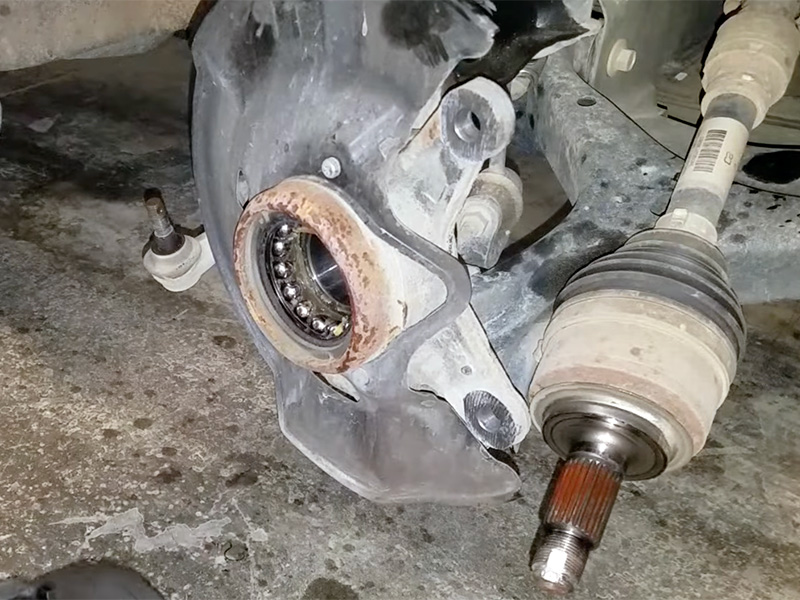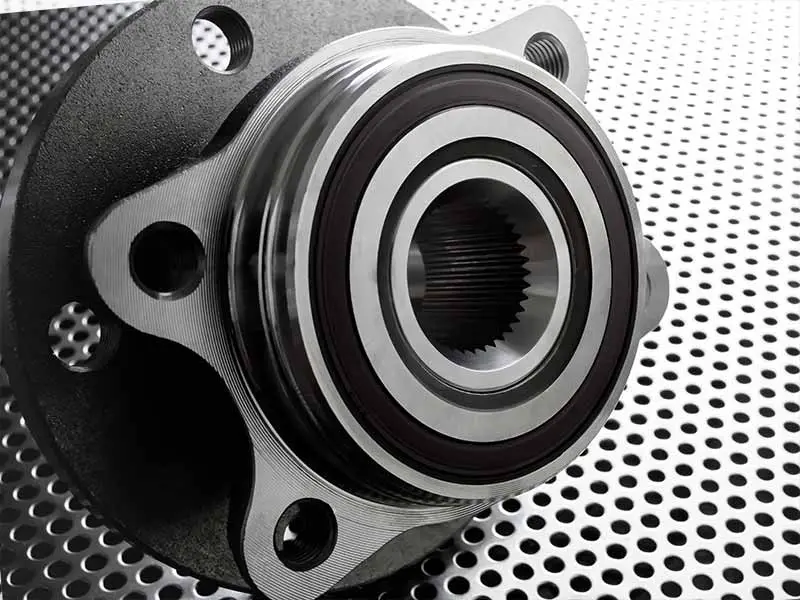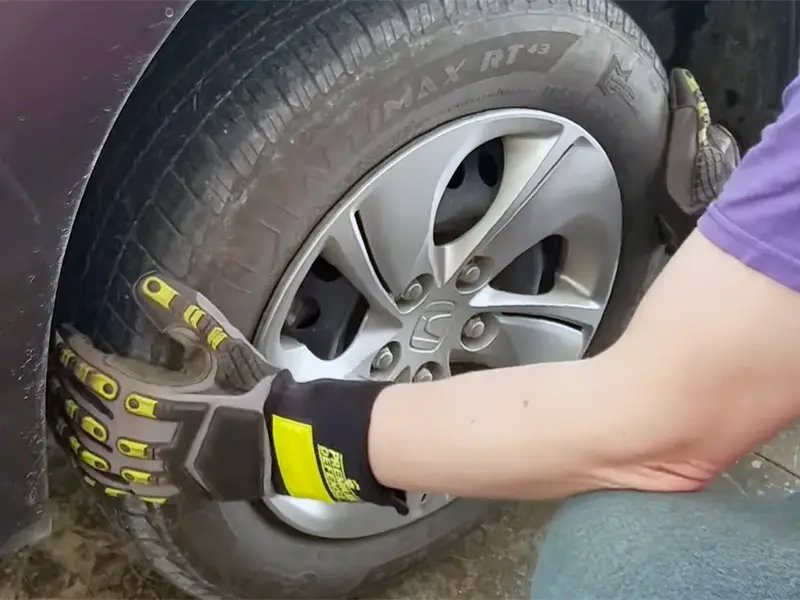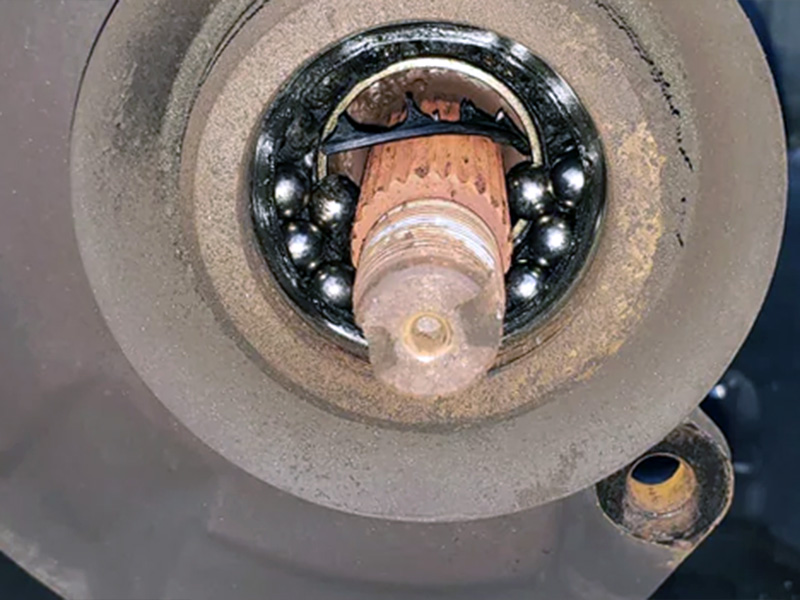Imagine you’re driving, and suddenly you hear an unusual humming noise, or you feel your car vibrating strangely. These could be signs of a wheel bearing failure, a critical issue that, if ignored, can lead to serious consequences for your vehicle and safety.
What Happens When A Wheel Bearing Goes Out?
If a wheel bearing fails, it can lead to loss of vehicle control, wheel lockup, or detachment, potentially causing a serious accident.
In this article, we delve into the lifespan, durability, symptoms, and consequences of wheel bearing failures, and offer practical tips on how to maintain and check them for a safe driving experience.

What Happens If a Wheel Bearing Fails?
Understanding the consequences of a wheel bearing failure is crucial for recognizing its seriousness. Here’s what can happen if a wheel bearing fails, particularly while you’re driving.
Immediate Consequences of Bearing Failure
- Loss of Control: The most immediate and dangerous consequence is the potential loss of control over the vehicle. This can happen if the bearing completely seizes or breaks apart.
- Wheel Lockup or Detachment: In extreme cases, a failed bearing can cause the wheel to lock up or even detach from the vehicle, leading to a serious accident.
Long-Term Effects
- Damage to Other Parts: A failed bearing can cause damage to surrounding parts like the wheel hub, axle, and braking system, leading to more extensive and expensive repairs.
- Safety Hazards: Driving with a failing or failed bearing significantly increases the risk of accidents due to compromised vehicle handling and stability.
Warning Signs and Prevention
- Early Detection: Regular checks and responding to warning signs, like unusual noises or vibrations, can prevent catastrophic failures.
- Professional Inspection: At the first sign of trouble, a professional inspection is crucial. This can help catch issues before they lead to failure.

Lifespan and Durability of Wheel Bearings
When it comes to car parts, one of the most common questions is, “How long will it last?” Well, wheel bearings are no exception. Let’s talk about their lifespan and what factors can affect their durability.
Average Life Expectancy of Wheel Bearings
- Mileage Matters: Typically, wheel bearings can last anywhere between 85,000 to 100,000 miles. But remember, this is just an average. Some might need attention sooner, while others could keep rolling beyond these numbers.
- Driving Conditions: The lifespan of your wheel bearings heavily depends on your driving habits and conditions. Cruising on smooth highways? They’ll likely last longer. Regularly tackling rough, unpaved roads? They might wear out sooner.
Factors Affecting Wheel Bearing Durability
- Quality of the Bearing: This one’s a no-brainer. Higher quality bearings usually mean a longer life.
- Installation: Incorrect installation can shorten a bearing’s life dramatically. It’s always best to have them installed by a professional.
- Load and Stress: Heavier vehicles or those that frequently carry heavy loads put more stress on wheel bearings.
- Maintenance: Regular checks and maintenance can prolong their life. Even something as simple as ensuring proper wheel alignment can make a difference.
When to Take Action
Now, you might be thinking, “My car’s hit the 85,000-mile mark, should I be worried?” Not necessarily. But it’s a good idea to be vigilant. Start by listening for any unusual noises, especially a humming sound that gets louder with speed – a classic sign of wheel bearing distress.

Recognizing the Symptoms of a Bad Wheel Bearing
Knowing the signs of a failing wheel bearing is crucial for timely maintenance and safety. Let’s break down the symptoms you should keep an ear and eye out for.
Key Symptoms to Be Aware Of
- Unusual Noises: This is often the first sign. A humming, rumbling, or growling noise that increases with speed or as the vehicle turns can indicate a bad bearing.
- Excessive Vibration: If you feel unusual vibrations coming from your wheels, especially at consistent speeds, it might be a wheel bearing issue.
- Loose Steering: A worn-out bearing can affect your car’s steering, making it feel loose or less responsive.
- Uneven Tire Wear: Sometimes, a bad bearing can cause uneven wear on your tires, though this can also be a sign of other issues.
What’s That Sound?
The sound of a failing wheel bearing is distinct. It often starts as a faint humming and becomes more pronounced over time. Curious about how it sounds? You can find an example of this humming noise, which gets louder with speed, on our website.
Visual and Physical Checks
- Wobble Test: Jack up your car and try wiggling the wheel. If there’s a lot of play, it could be a sign of a bad bearing.
- Look for Leaks: Sometimes, a failing wheel bearing can cause the seal to break, leading to visible grease leaks.

Identifying a Failing Wheel Bearing
Detecting a bad wheel bearing during a drive is crucial for addressing the issue promptly. Here’s how to tell which wheel bearing might be giving you trouble on the road.
Listening and Feeling
- Noise Direction: Pay attention to where the noise comes from. A bad left wheel bearing typically makes more noise when you turn right and vice versa.
- Vibration and Handling: Feel for any vibrations in the steering wheel or the seat, which can indicate which side the problem is on. Also, notice any changes in handling or steering responsiveness.
On-the-Go Diagnosis
- Changing Speeds: Notice if the noise or vibration changes with speed. A wheel bearing issue will often become more noticeable as you accelerate.
- Turning the Vehicle: The sound and vibration may intensify when you make turns, particularly sharp ones. This can help pinpoint which bearing is failing.
What to Do If You Suspect a Bad Bearing
- Safety First: If you suspect a wheel bearing issue, it’s essential to address it as soon as possible. A failing bearing can lead to serious safety issues.
- Professional Check: While these tips can help you identify a potential problem, a professional mechanic can give a definitive diagnosis and solution.

How Long Do Wheel Bearings Last After They Start Making Noise?
One of the most pressing questions for any driver noticing a noisy wheel bearing is: How much time do I have before it completely fails? Let’s discuss what the noise means and how you should respond.
Understanding the Noise Timeline
- Early Stages: Initially, the noise from a failing wheel bearing might be barely noticeable. However, this is the best time to act.
- Progression: As the bearing continues to wear, the noise will become louder and more constant. This indicates increasing damage and risk.
- Urgency: Once the noise is loud and continuous, it’s a strong sign that the bearing is close to failing. This stage requires immediate attention.
Factors Affecting the Timeline
- Driving Conditions: If you frequently drive on rough roads or at high speeds, the deterioration can accelerate.
- Vehicle Type and Load: Heavier vehicles or those carrying heavy loads might see a faster progression from noise to failure.
Taking Action
- Prompt Response: As soon as you notice any unusual noise, it’s advisable to get it checked. Waiting can lead to more damage and higher repair costs.
- Professional Inspection: A mechanic can assess the severity and recommend whether immediate replacement is needed. Our article on front tire making loud noise when driving offers more insights on related noises and their implications.

Preventive Measures and Maintenance Tips for Wheel Bearings
Maintaining your wheel bearings is not just about avoiding repair costs; it’s about ensuring your safety on the road. Here are some tips and preventive measures to keep your wheel bearings in good condition.
Regular Maintenance: The Key to Longevity
- Regular Checks: Include wheel bearing inspection in your regular vehicle maintenance schedule. This helps in early detection of potential issues.
- Listen and Feel: Be attentive to any changes in your vehicle’s sounds and how it feels while driving. Early detection of issues like noise or vibrations can save you from bigger problems later.
Professional Inspections
- Routine Service Appointments: During regular service, ask your mechanic to check the wheel bearings. This is especially important for vehicles that frequently drive on rough roads or carry heavy loads.
- Expert Diagnosis: If you suspect a problem, a professional mechanic can provide an accurate diagnosis and recommend the best course of action.
Driving Habits and Conditions
- Mind the Roads: Try to avoid excessively rough or unpaved roads, as they can accelerate wear on bearings.
- Load Management: Avoid overloading your vehicle, as excess weight can increase the stress on wheel bearings.
Resources
Below are some links you may find helpful when learning about tires:
- Wheel bearings: how long do they last? – Mechanic Base
- Symptoms of a bad wheel bearing – Car and Driver
Final Thoughts
Wheel bearings might be small components in the grand scheme of your vehicle, but their role is crucial. This article has covered the key aspects of wheel bearings, from their average lifespan to the tell-tale symptoms of failure, and what to do when you suspect a problem.
Regular checks, understanding the warning signs, and promptly responding to any issues can go a long way in preventing serious accidents and ensuring a smoother, safer drive.
Good luck and happy motoring.





